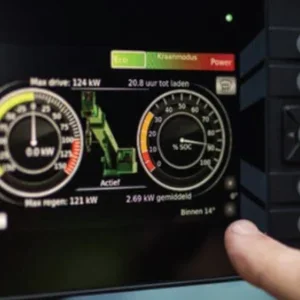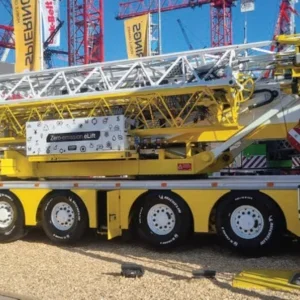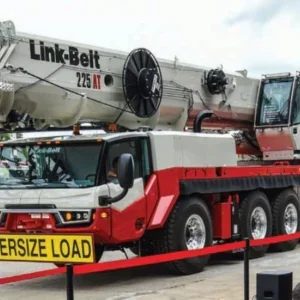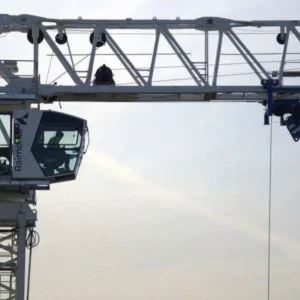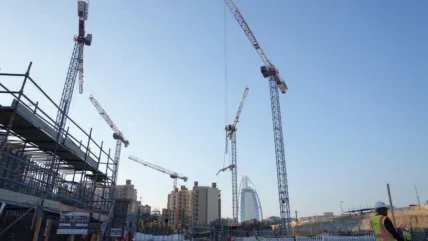
The construction industry in the Middle East and North Africa (MENA) region is expected to see significant growth in the coming years. This growth is anticipated to be driven by investments in transportation, energy, and other commercial projects, along with budgetary allocations. Infrastructure output in the Middle East is expected to increase, supported by showcase projects such as the Saudi Arabia FIFA World Cup in 2034.
The industrial sector has also benefitted from economic diversification and the Middle East has now become a destination for a number of ambitious hydrogen projects.
To gain greater insight into construction in the region we take a closer look at the following four key markets: Saudia Arabia, Quatar, UAE, and Egypt.
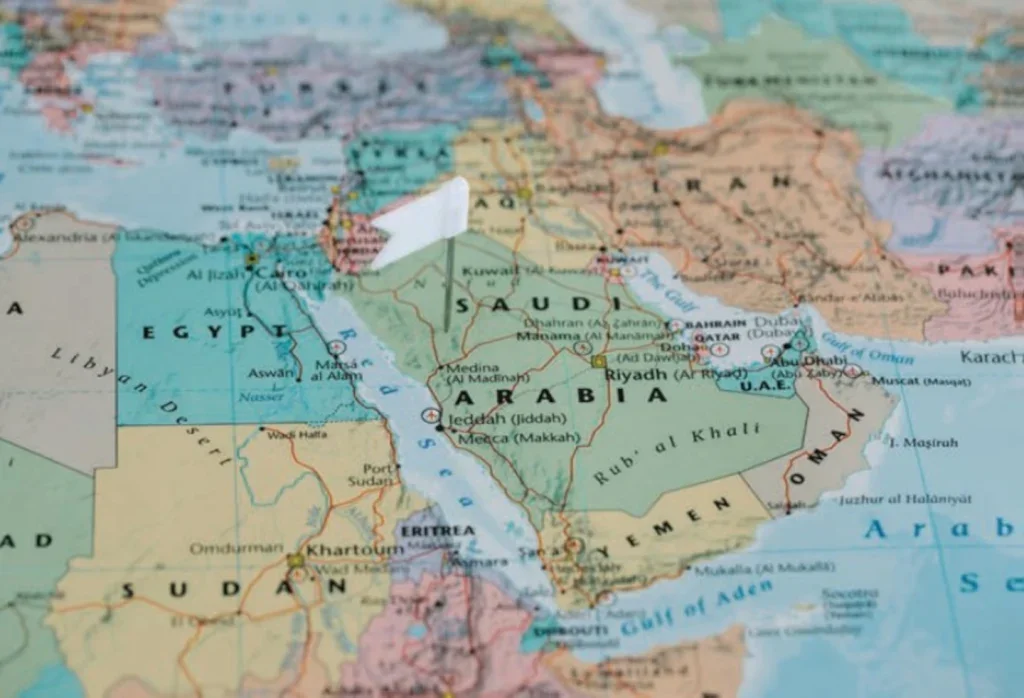
SAUDI ARABIA
Saudi Arabia’s construction sector is on a solid growth path with data analytics company Global Data forecasting real growth at 4.4% in 2025. This is underpinned by investments in transport, energy, real estate, tourism, and digital infrastructure.
The Kingdom’s commitment to Vision 2030, and its ambition to host the FIFA World Cup 2034, are key catalysts prompting accelerated spending across various construction segments.
When it comes to government budget and sectoral spending, in November 2024 Saudi Arabia approved a SAR1.3 trillion ($342.7 billion) budget for 2025. This was up 2.6% from 2024’s figure.
Key allocations include SAR260 billion ($69.3 billion) for healthcare and social development; SAR201 billion ($53.6 billion) for education; and SAR42 billion ($11.2 billion) for infrastructure and transportation.
This strong fiscal position enables the public sector to fund key projects, while private sector participation continues to expand, especially in the real estate sector, which saw a 13.3% growth in bank loans in 2024.
In early 2025 the Saudi Contractors’ Authority reported SAR6.5 billion ($1.7 billion) in contracts awarded in January alone, with plans for over 25 new contracts in infrastructure, housing, and industrial segments. The total 2024 contract value reached SAR268.1 billion ($71.5 billion) – the highest post-Covid figure.
Standout projects include SAR1.9 billion ($500 million) for the Sedra Community housing development project in northern Riyadh; the project is from the Roshn Group, which claims to be a key enabler of Saudi Vision 2030. And SAR12 billion ($3.2 billion) in water projects in Aseer, Qassim, and Al Baha.
The real estate, leisure, and data infrastructure sectors are also driving growth. Licenses worth SAR146.3 billion ($39 billion) for 192 real estate projects were issued in 2024. Saudi Entertainment Ventures (Seven) plans to develop 21 entertainment hubs across 14 cities by 2027 with SAR50 billion ($13.3 billion).
Data centres are emerging as a major growth driver, with electrical construction products specialist Alfanar committing SAR5.3 billion ($1.4 billion) for new facilities.
Neom, the sustainable region taking shape in northwest Saudi Arabia, and DataVolt, a Saudibased international developer, investor and operator of data centres have also partnered to create Saudi Arabia’s first sustainable AI data centre in Oxagon. An initial investment of USD 5 billion by DataVolt will fund the first phase of the factory’s development, expected to be operational by 2028. Neom says the agreement marks a significant milestone in the expansion of KSA’s digital infrastructure, reinforcing its position as the region’s leading data hub.
Green infrastructure and renewable energy projects are also underpinning construction growth. Saudi Arabia’s energy transition strategy targets netzero GHG emissions by 2060.
Key projects include in this area include SAR31.5 billion ($8.4 billion) invested in creating the ‘Green Hydrogen Corridor by ACWA Power and Sefe.
ACWA Power and Sefe are partnering to establish a “hydrogen bridge” between Saudi Arabia and Germany, aiming to supply 200,000 tonnes of green hydrogen annually to Germany and Europe by 2030.
SEFE will act as both a co-investor and prime offtaker, marketing the green hydrogen to its German and European customers.
Battery Energy Storage Systems (BESS) are another area of investment. A SAR7.5 billion ($2 billion) contract has been awarded to Chinese automaker, and subsidiary of the BYD Company, BYD Auto for five 500MW storage sites.
The National Water Strategy 2030 is a key priority for the Saudi government. In March 2025, a 587km water pipeline between Jubail and Buraydah was approved with a budget of SAR8.5 billion ($2.2 billion). Meanwhile, Saudi Telecom Company (STC) signed an SAR32.64 billion ($8.7 billion) deal to develop national telecom infrastructure.
QUATAR
Qatar is diversifying through LNG, renewable energy, and infrastructure expansion. Its construction industry is forecast to expand 2.3% in 2025, supported by strategic budget allocations and long-term development plans like the Qatar National Vision 2030 and the Transportation Master Plan 2050.
The 2025 budget forecasts expenditure of QAR210.2 billion ($57.8 billion), with QAR22 billion ($6.04 billion) being spent on the healthcare sector, QAR19.4 billion ($5.3 billion) spent on education and QAR3.9 billion ($1.1 billion) on transport development.
Tourism and R&D related construction will account for QAR3.6 billion ($989 million) and QAR1.1 billion ($302.2 million), respectively, while QAR7 billion ($1.9 billion) worth of water and electricity projects are slated for tendering in 2025.
Key projects in the energy and industrial megaprojects sector include a QAR13.5 billion ($3.7 billion) investment in the Ras Abu Fontas Power & Desalination Plant. This project by Samsung C&T and Sumitomo is due for completion by 2029.
When it comes to offshore gas infrastructure, there’s a QAR14.6 billion ($4 billion) project by Saipem for QatarEnergy LNG.
Qatar also aims to double its urea production to 12.4 million tonnes/year by 2030 through a major fertiliser complex in Mesaieed. The country is also investing heavily in solar power, targeting 4,000MW of solar energy by 2030.
Growth in the construction industry will also be supported by the Transportation Master Plan for Qatar (TMPQ) 2050. This outlines 37 road projects and 30 transit network expansions.
In May 2024 Kahramaa, a company that regulates and maintains the supply of electricity and water for the population of Qatar, unveiled a renewable energy strategy to increase clean power to 18% by 2030 and slash CO2 emissions by 27%.
From 2026 to 2028, annual average growth is projected at 4.5%, driven by LNG, renewables, and industrial capacity expansions.
UAE
The UAE shows resilient growth amidst inflationary pressures.
The UAE construction sector is projected to grow by 4.2% in 2025, underpinned by a diversified portfolio of energy, housing, transport, and tourism infrastructure. While the industry faces short-term headwinds from inflation, supply chain disruptions, and geopolitical uncertainty, robust FDI and major projects continue to support its medium-term trajectory.
The UAE approved a AED71.5 billion ($19.5 billion) federal budget for FY 2024-25, an 11.6% increase YoY. This includes: a budget of AED10.9 billion ($3 billion) for education and a budget of AED5.7 billion ($1.6 billion) for healthcare.
Mega residential and leisure projects are also big business in the UAE.
Key residential and leisure projects include Al-Tay Hills in Sharjah, which has an estimated spend of around AED3.5 billion ($953 million). The project claims it will ‘transform visionary real estate inspired by land, culture, and sustainable best practices into iconic spaces that shape extraordinary lifestyles’ and will include 1,100 villas, malls, and green paths.
There’s also Azizi Venice, a residential development by Azizi Developments in Dubai South. AED30 billion ($8.2 billion) has been slated for this project. And a JW Marriott Resort by Wow Resorts which will see around AED4.8 billion ($1.3 billion) of spending to create a total of 524 apartments.
Azizi Developments is also investing AED60 billion ($16.3 billion) in building 50 luxury hotels in Dubai by 2030.
Clean energy and industrial diversification are also making their presence felt on the construction landscape.
Under the Dubai Net Zero Strategy 2050, Masdar (also known as the Abu Dhabi Future Energy Company), an Emirati state-owned renewable energy company which claims to be one of the world’s largest renewable energy investors, will develop an AED22 billion ($6 billion) solar + BESS system (5,200MW PV and 19 GWh BESS).
Global chemicals and transition fuels company Ta’ziz awarded Samsung E&A an AED6.2 billion ($1.7 billion) contract for the UAE’s first methanol plant.
When it comes to transport and sewerage infrastructure there’s the Dubai Metro Blue Line project. Around AED20.2 billion ($5.5 billion) will be spent on the transport link which will span 30km and include 14 stations.
The Dubai Strategic Sewerage Tunnels (DSST) project will involve an estimated AED80.8 billion ($22 billion) of spend. It is is among one of the largest planned infrastructure investments.
Key roads, including Oud Metha and Al-Asayel Streets, are also being expanded thanks to a slated spend of around AED598.6 million / $163 million.
Annual growth is projected at 4% from 2026 to 2029, bolstered by tourism, logistics, and economic zone development.
EGYPT
Overall Egypt is showing strong recovery despite external challenges. The country’s construction industry is expected to grow by 6.5% in 2025, rebounding from macroeconomic volatility, currency devaluation, and regional geopolitical tensions.
The growth will be mainly driven by government-led investments in transport, housing, and energy, plus rising activity in the private sector.
When it comes to budget and infrastructure spending for the FY2024/25 financial year, the government announced a record capital expenditure of EGP3.9 trillion ($92.2 billion) for FY2024/25, up 30% YoY.
Major allocations include a spend of EGP1 trillion ($23.6 billion) on infrastructure; a spend of EGP858 billion ($20.3 billion) on education facilities; EGP497 billion ($11.8 billion) for the health sector; and EGP140.1 billion ($3.3 billion) allocated to scientific research.
To address the budget deficit, Egypt aims to raise a figure of EGP132.6 billion ($3 billion) via international bonds.
Key investments and projects are seeing a ramping-up of investment from private sources. For example, Egyptian economic giant Organi is expected to spend EGP44.2 billion ($1 billion) for auto manufacturing and 20,000 hotel rooms compared to the Egyptian ministry of transport which is building 2,300km of road network in FY2024/25 with a budget of EGP37 billion ($837 million).
In the medium-term prospects for the construction industry in Egypt between 2026 to 2029 are forecast to grow eight percent annually. This is supported by the construction of transport corridors, housing expansion, power grid development and effort to meet green hydrogen and renewable energy targets (it’s looking to hit a renewable energy share target of 40%).
In conclusion, the general outlook is that the construction sector in the region is poised for sustained expansion. While Saudi Arabia leads with giga-projects aligned with Vision 2030 and Qatar builds on LNG and green infrastructure, the UAE continues diversifying through leisure and clean energy megaprojects. Despite fiscal and geopolitical risks, Egypt is staging a comeback through strategic public spending and private investment.
KANOO SUPPLIES JASO CRANE FOR SUBSTATION BUILD
Dubai-based lifting solutions provider Kanoo Cranes has supplied a Jaso J560 tower crane in for the L&T Barsha South DEWA (Dubai Electricity and Water Authority) Substation construction project.
The company says the heavy-duty crane is well-suited to the work as it is engineered to handle precast loads with precision and efficiency.
A few months ago representatives from Jaso went to Dubai to develop its business strategy for upcoming construction projects in the region.
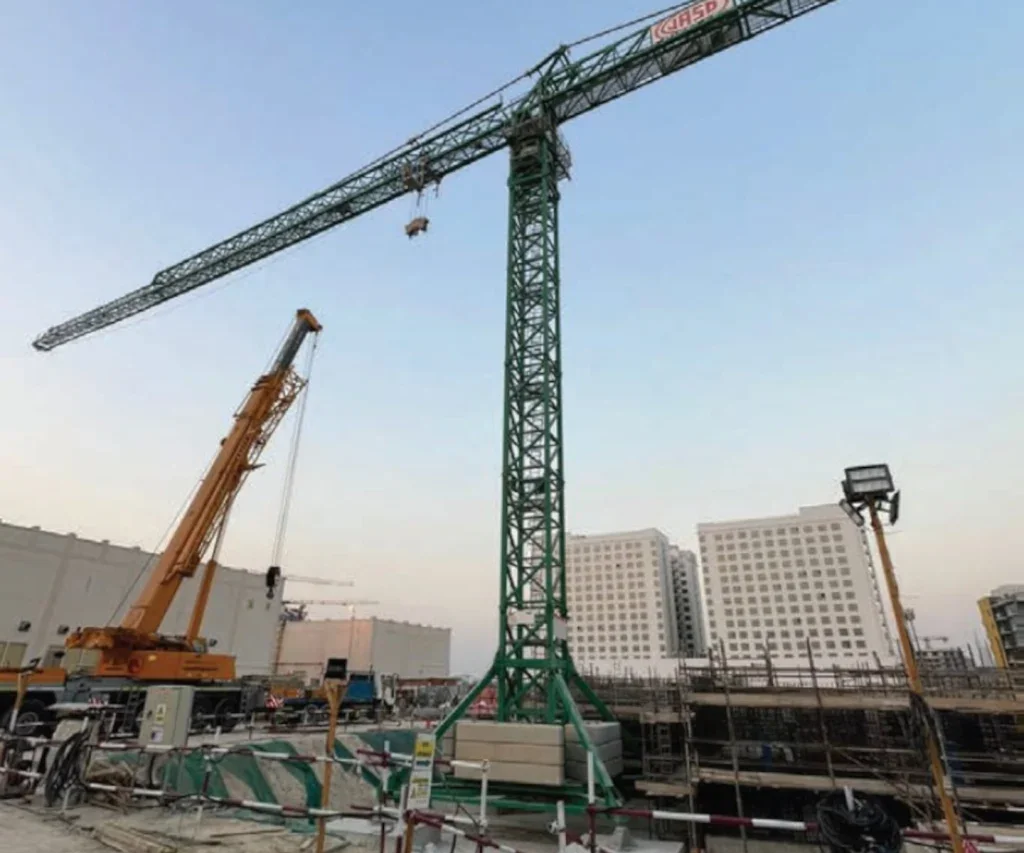
‘Our collaboration aims to define and optimise operations that will shape the future of construction over the next few years, ensuring that we continue to deliver innovative, reliable, and efficient solutions for our clients,’ says Jaso.
In addition to the Jaso collaboration, Kanoo says it also partners with crane manufacturers Maeda and Spierings to deliver cutting-edge technology for construction, infrastructure, and industrial applications in the region.
SUCCESS FOR WOLFFKRAN IN SAUDI ARABIA
Tower crane manufacturer Wolffkran has been actively looking to position itself to meet the growing construction demands in the Middle East and, in particular, Saudi Arabia.
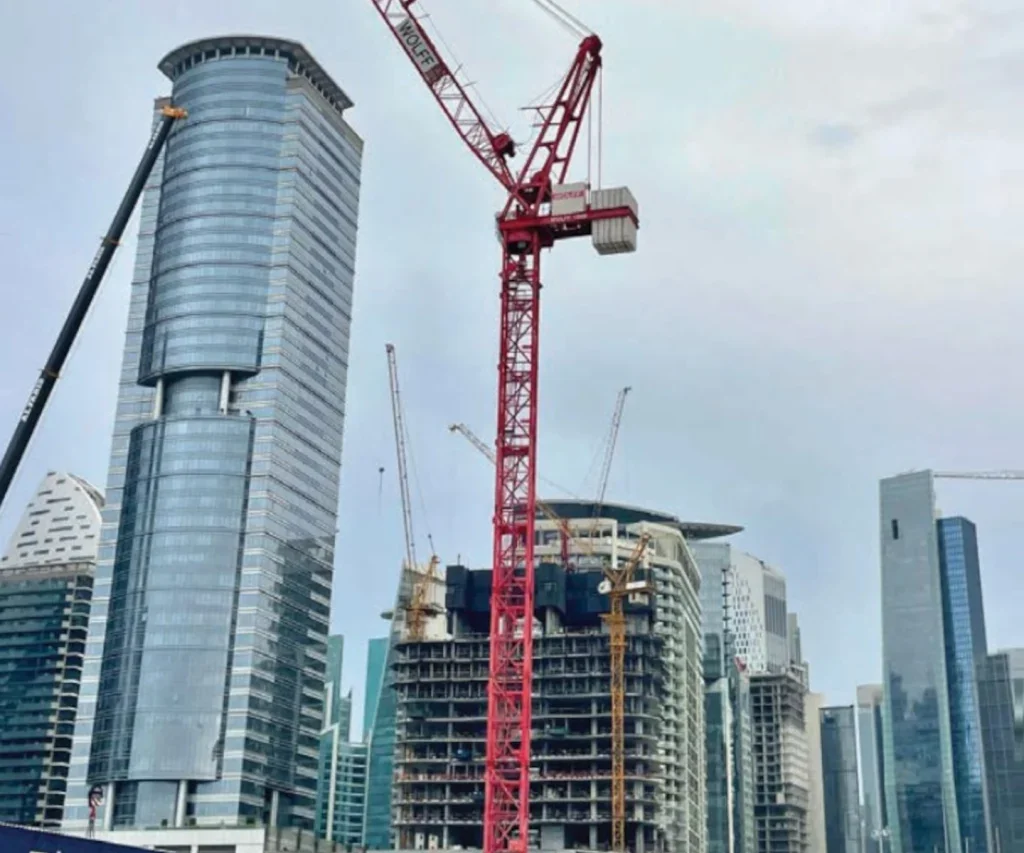
At the start of 2024 Wolffkran announced it had entered into a joint venture with the Zamil Group, one of the largest investment holding companies in the Kingdom of Saudi Arabia (KSA). The joint venture is working to open a Wolff crane production facility in KSA and to build up a rental fleet of 300 Wolff cranes; according to CEO Duncan Salt this plan is well on its way to fruition. The production facility will be the first tower crane manufacturing plant in the entire Middle East and will supply Wolff cranes not only to the Saudi Arabian market but to the entire MENA region.
In April 2025 Wolffkran announced it has also won a prestigious contact to supply cranes to the King Salman International Stadium. Once complete the multi-purpose stadium will be capability of hosting world-class events and will be the largest stadium within the Middle East. It will host the 2034 FIFA World Cup with a planned capacity of 92,760 people.
JAPANESE DENZAI GROUP OPENS DENZAI ARABIA
Japanese heavy lift and move company Denzai has opened Denzai Arabia located in Jubail, Kingdom of Saudi Arabia.
The company was established to deliver integrated construction and transportation services in Saudi Arabia and the Middle East, including port transportation and installations at project sites.
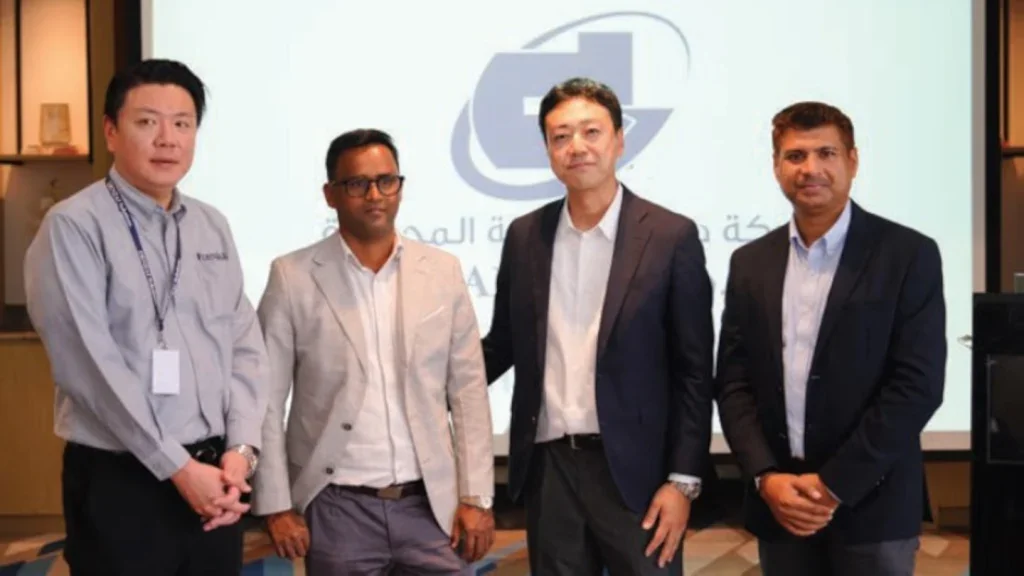
Denzai Arabia has also established a joint venture with Fawaz Ali Alshammari Co. for transportation (FTE Logistics). Fawaz Ali Alshammari is a Saudi-owned company with more than 25 years of experience in heavy lifting in the region, to better provide services in KSA and neighbouring countries.
“Saudi Arabia is aiming to break free from its oil dependent economy by fostering the creation of new industries, large-scale infrastructure development currently underway,” said Kohki Uemura, president and CEO at Denzai. “Among these efforts the development of wind power generation is considered one of the most important projects. Denzai plans to leverage the expertise it has developed in wind power plant construction to contribute to Saudi Arabia’s promotion of decarbonisation and carbon neutrality.”
LA’ALA AL KUWAIT TAKES DELIVERY OF SIXTH TADANO ROUGH TERRAIN CRANE
La’ala Al Kuwait Real Estate Company has taken delivery of a sixth new Tadano GR rough terrain crane. All six rough terrains are being utilised in the Sabah Al Ahmad Sea City Project.
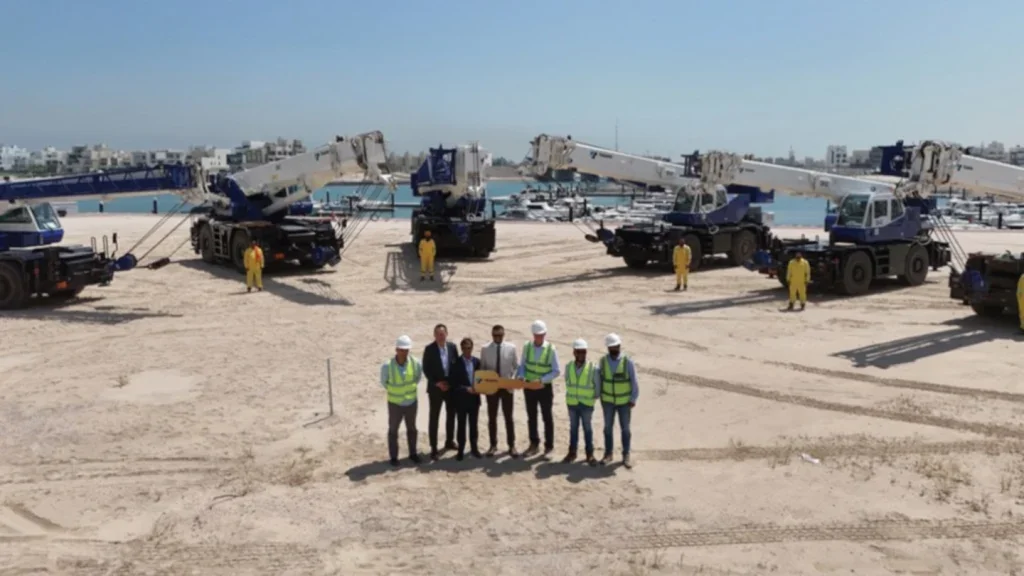
“The arrival of the 145-tonne GR-1450EX completes the expansion of our fleet and positions us well to handle the diverse challenges presented by the project,” said Matthew Roden, director of infrastructure and construction management at La’ala Al Kuwait. “In addition to the GR-1450EX, Tadano has also recently supplied us with three 30-tonne GR-300EXs, one 50-tonne GR-500EXL, and one 80-tonne GR-800EX. These cranes are already proving their value, especially with their pick-and-carry capabilities, which are being effectively applied across our extensive infrastructure works.
Sabah Al Ahmad Sea City is a large residential and mixed-use waterfront city in southern Kuwait. The construction site covers many kilometres of open land, where rough terrains are best-suited due to their flexibility and high mobility. Typical applications include laying several hundred kilometres of sewer and stormwater networks, bridge and building construction, marina pontoon launching, and many other infrastructure projects associated with this megacity.
SEVEN RAIMONDI FLAT-TOPS FOR PRESTIGIOUS DUBAI MASTERPLAN
Raimondi Middle East deployed seven Raimondi MRT159s to support the construction of one of the UAE’s most prominent residential districts.
“We are proud to participate in the development of one of Dubai’s most anticipated masterplans by renting seven Raimondi MRT159 flat-top tower cranes to the project’s contractor,” stated Wael Hasan, general manager, Raimondi Middle East.
Hasan, highlighting the characteristics of the crane that made it well suited to the unique challenges of the jobsite, confirmed that “a positioning and installation study fundamental to maximize machine performances and overall safety” was undertaken prior to choosing the MRT159 for the site.
Situated between other construction sites with a narrow layout, the site posed both logistical and operational challenges. “The ease of installation and commissioning coupled with good lifting performance made the MRT159 an excellent crane to satisfy project requirements, demonstrating its adaptability to tight urban environments,” he added.
Erected between July and October by the Raimondi Middle East operations team the MRT159s arrived onsite with all parts pre-assembled, ropes passed, and rope connections set, facilitating smooth field procedures. The seven flat-tops have jib lengths ranging from 38m and 44m, with freestanding heights of 39m, 45m, and 51m respectively. With a maximum lifting capacity of eight tonnes, the machines are equipped with a 30kW hoisting gear, lifting at a maximum speed of 80m/min and have a drum capacity of 440m.
The new complex will feature 326 units spanned over five-storeys, with the cranes remaining onsite for approximately 15 months.
“The deployment of the MRT159s for one of the region’s most reputable developers further underscores Raimondi’s commitment to supporting major developments across the GCC region. We are providing tailored solutions that meet the region’s growing demand for advanced, versatile lifting equipment,” commented Luigi Maggioni, Raimondi Group CEO.


